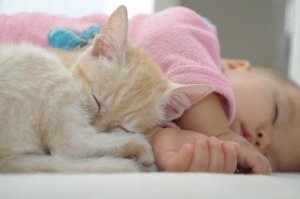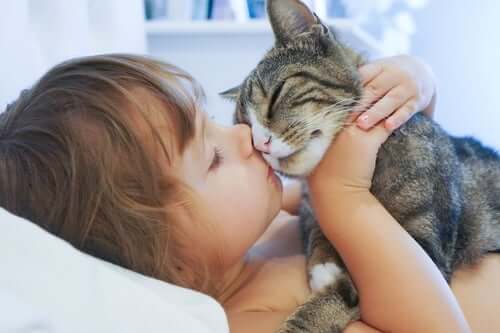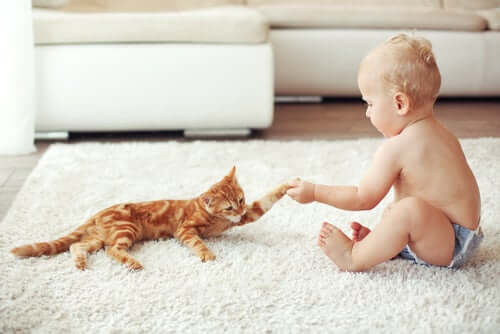Is it True that Cats Can Calm Crying Babies?

While the old saying states that a dog is a man’s best friend, there’s no denying that cats have also earned their place. In today’s article, we’ll tell you how cats can calm crying babies. We’ll also share more benefits of having a cat for a pet in your home.
Cats can calm crying babies
The arrival of a new addition to the family is a special moment in any home. This isn’t only true for parents and siblings, but also for pets. People claim that cats are much more independent than dogs and don’t pay attention to what goes on in the home. However, that’s definitely not the case.
Many felines have earned the title of “baby-sitters” because of their role in raising little ones. In fact, there’s a sweet video making its way around the internet that shows a cat calming a crying baby. It’s such a lovely scene.

The child is lying in bed and starts to cry. The boy’s sister is holding their cat, who is desperate to come to the little boy’s aid. As soon as she lets it go, the cat runs towards the bed and jumps up to offer comfort. The little boy’s reaction is immediate. He stops crying right away as if it were magic.
And all the cat did was stay by is side as still as possible… Face to face, demonstrating its love and cultivating the little boy’s eternal trust.
The relationship between cats and babies (and children)
When we think about the image of “the perfect family”, we often picture parents, children, and a dog. However, cats can also be the perfect pet. In fact, in several ways, they’re even better! Especially because they don’t require the same level of care and attention that dogs do. The relationship between children and felines is very interesting. They both learn from one another and become the best of friends.
Children that grow up with a cat in their home develop a great sense of responsibility. This is no minor detail, as it’s not easy for parents to instill responsibility through chores and obligations. And, as we can observe in the video mentioned above, cats can calm crying babies. In fact, they can have a calming effect on children in any situation.
And as if that weren’t enough, children that grow up with cats in their home will have fewer allergies as adults. Being in contact with cat fur strengthens the immune system.
In order for the relationship between children and cats to be perfect, cats should possess certain characteristics:
Be able to tolerate loud noises
Cats that are skittish or nervous will have a really hard time sharing a home with little ones.
Not be territorial
If children get into a territorial cat’s intimate space (like its bed or litter box) this can cause problems. Therefore, permissive, docile cats are the best fit.
Be affectionate
This means your cat won’t only allow you and your family members to pet and hug him, he’ll even ask you to!
Be sociable
Cats that are solitary and independent often do their own thing, without paying attention to children. Therefore, we suggest finding a cat that’s sociable and friendly.
Tips for homes with children and cats
It’s very important that cats and children respect one another. This means, for example, that children shouldn’t snoop around a cat’s bed. Nor should your cat jump up on your children’s bed, unless you allow them to.

Teach your children not to bother the cat when it’s eating or sleeping. Doing so may cause your feline friend to become scared, nervous or even ill. Also, show your children the best places to pet their cat. For example, on the cat’s head, back (not too close to the tail) and chin. Be sure to tell your child what not to do, too. For example, pull on the cats tail or whiskers.
While the old saying states that a dog is a man’s best friend, there’s no denying that cats have also earned their place. In today’s article, we’ll tell you how cats can calm crying babies. We’ll also share more benefits of having a cat for a pet in your home.
Cats can calm crying babies
The arrival of a new addition to the family is a special moment in any home. This isn’t only true for parents and siblings, but also for pets. People claim that cats are much more independent than dogs and don’t pay attention to what goes on in the home. However, that’s definitely not the case.
Many felines have earned the title of “baby-sitters” because of their role in raising little ones. In fact, there’s a sweet video making its way around the internet that shows a cat calming a crying baby. It’s such a lovely scene.

The child is lying in bed and starts to cry. The boy’s sister is holding their cat, who is desperate to come to the little boy’s aid. As soon as she lets it go, the cat runs towards the bed and jumps up to offer comfort. The little boy’s reaction is immediate. He stops crying right away as if it were magic.
And all the cat did was stay by is side as still as possible… Face to face, demonstrating its love and cultivating the little boy’s eternal trust.
The relationship between cats and babies (and children)
When we think about the image of “the perfect family”, we often picture parents, children, and a dog. However, cats can also be the perfect pet. In fact, in several ways, they’re even better! Especially because they don’t require the same level of care and attention that dogs do. The relationship between children and felines is very interesting. They both learn from one another and become the best of friends.
Children that grow up with a cat in their home develop a great sense of responsibility. This is no minor detail, as it’s not easy for parents to instill responsibility through chores and obligations. And, as we can observe in the video mentioned above, cats can calm crying babies. In fact, they can have a calming effect on children in any situation.
And as if that weren’t enough, children that grow up with cats in their home will have fewer allergies as adults. Being in contact with cat fur strengthens the immune system.
In order for the relationship between children and cats to be perfect, cats should possess certain characteristics:
Be able to tolerate loud noises
Cats that are skittish or nervous will have a really hard time sharing a home with little ones.
Not be territorial
If children get into a territorial cat’s intimate space (like its bed or litter box) this can cause problems. Therefore, permissive, docile cats are the best fit.
Be affectionate
This means your cat won’t only allow you and your family members to pet and hug him, he’ll even ask you to!
Be sociable
Cats that are solitary and independent often do their own thing, without paying attention to children. Therefore, we suggest finding a cat that’s sociable and friendly.
Tips for homes with children and cats
It’s very important that cats and children respect one another. This means, for example, that children shouldn’t snoop around a cat’s bed. Nor should your cat jump up on your children’s bed, unless you allow them to.

Teach your children not to bother the cat when it’s eating or sleeping. Doing so may cause your feline friend to become scared, nervous or even ill. Also, show your children the best places to pet their cat. For example, on the cat’s head, back (not too close to the tail) and chin. Be sure to tell your child what not to do, too. For example, pull on the cats tail or whiskers.
This text is provided for informational purposes only and does not replace consultation with a professional. If in doubt, consult your specialist.








